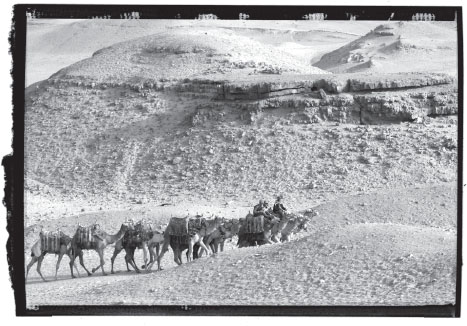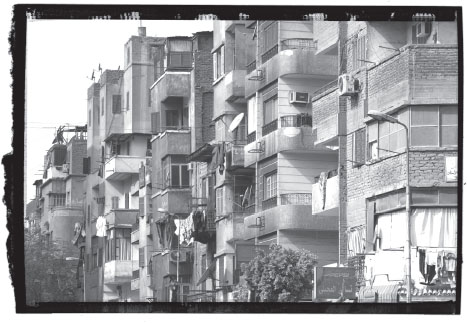Egypt (8 page)
Authors: Patti Wheeler
My parents were waiting for me at the station when the train arrived.
“Hey, partner,” my dad said. “Had a rough go of it, huh?”
“You could say that.”
“Dr. Aziz called,” my mom said. “He wanted to make sure you knew there was no shame in leaving the expedition. He said you are certainly not the first.”
“Even Dr. Aziz has had panic attacks during his explorations,” my dad said. “Just goes to show you, it happens to the best of them.”
I know they meant well and all, but I was in no mood for a pep talk.
“Can you please take me back to the hotel?” I asked. “I’d like to be alone for a while.”
“Sure,” my mom said, and put her arm over my shoulder. “Let’s go.”
FEBRUARY 26, 8:41 PM
TOMB COMPLEX OUTSIDE ALEXANDRIA, EGYPT
16° CELSIUS, 61° FAHRENHEIT
SKIES CLEAR, WIND CALM
We’ve settled into a camp made up of sixteen large tents. The camp sits high atop the desert dunes, approximately thirty miles southwest of Alexandria. James, Serene, and I are sharing a tent. It’s very basic, with a cot and small desk for each of us, and there is a small bathroom attached. Dr. Aziz is outside inspecting the equipment with his assistant, Khalid, a 28-year old archeology student who is pursuing his doctorate. Our work begins tomorrow.

Camels carrying supplies through the desert
I can’t stop thinking about the conversation I had with Dr. Aziz at the airport. Overcoming doubt. As he said, it’s one of the greatest challenges an archeologist will face. Truth is, this applies to anyone who takes big risks. Being able to overcome doubt depends on a person’s ability to stay the course when everyone else is ready to throw in the towel. But even strong willed people need “a little luck” every now and again. Reading the journals of some of the great archeologists, I’ve learned that they all struggled with doubt. Often-times, it was luck that pulled them through. Take Howard Carter, for example, who wrote the following in his book,
The Discovery of the Tomb of Tutankhamen.
“We had almost made up our minds that we were beaten, and were preparing to leave The Valley and try our luck elsewhere; and then—hardly had we set hoe to ground in our last despairing effort than we made a discovery that far exceeded our wildest dreams.”
We could really use this kind of luck. We need to find something that will reassure Dr. Aziz that we are, in fact, digging in the right place. I’m optimistic, but this is all new to me. I haven’t been digging here for six seasons like Dr. Aziz. It must be hard to remain positive year after year when you have almost nothing to show for your effort.
FEBRUARY 26, 11:43 PM
TOMB COMPLEX, 30° 01’ N 31° 13’ E
14° CELSIUS, 57° FAHRENHEIT
SKIES CLEAR, WIND 5-10 MPH
By the light of a kerosene lantern, I’ve been reading all the material I could gather on the life of Cleopatra. I brought a book with me from home, and Khalid loaned me a binder of information to look over. If we’re going to find the long lost Queen, I want to know everything I can about her.
Below is what I’ve learned so far:
Cleopatra was born around 69 B.C. She was of Macedonian descent and her name, in Greek, means “glory to her fatherland.” She inherited the throne of Egypt at the age of eighteen and came to rule most of the eastern Mediterranean Coast. Cleopatra was educated in philosophy, politics, public speaking, and was fluent in nine languages.
Charismatic, cunning, and very intelligent, Cleopatra had a reputation as a formidable nemesis and ally. To say she was a strong woman is a huge understatement. She had relationships with two of the most powerful men in history—the Roman leader Julius Caesar, and the love of her life, the great General, Mark Antony. During the height of her reign, her wealth was unmatched in the world.
Throughout her life, Cleopatra had to fight for her power and many times she battled against her own family. Lying, cheating, banishment, assassination attempts, some successful, some not, Cleopatra definitely had a unique relationship with her relatives. Time and again, mothers fought wars against their sons, brothers against sisters, nephews against uncles.
Ultimately, Cleopatra was taken captive by her Roman rival, Octavian, and the end of her reign was all but guaranteed. Instead of letting her rival determine her fate, Cleopatra took her own life. Legend has it that she requested an asp be placed next to her in bed. She was soon bitten by the highly venomous snake and died not long after. Some believe she was buried with Mark Antony, who had died in her arms shortly before her own passing.
All right, it’s getting late and we have some pretty tough days ahead. Time to extinguish the lantern and get some sleep.
FEBRUARY 27
CAIRO
Last night was pretty much torture, thinking about the fellowship and all. Didn’t sleep a whole lot. Tried, but couldn’t. There were so many thoughts moving through my head that they got all backed up like the Cairo traffic.
Just after the sun was up, my mom walked into my room. Judging by the way she tilted her head and squinted her eyes, I must have looked like one of those mummies we found at A1.
“You feeling okay this morning?” she asked, concern in her voice.
“I’ve felt better,” I said.
“I have an idea,” she said. “I know you’re interested in learning Arabic. I thought maybe you would enjoy helping me at the school today.”
I sat up in bed and shrugged my shoulders. I mean, normally I would have been totally into something like that, but this morning I didn’t feel like doing much of anything.
“Come on,” she said. “It will be fun. The kids are great. You’ll love spending time with them and they’ll teach you some Arabic. What do you say?”
My dad had left for Giza before sunrise to work on his paintings, and it was obvious that sitting around the room wasn’t going to do me a whole lot of good, so I agreed.

Downtown Cairo apartments
The cab dropped us off in front of a concrete building on a busy street a few blocks east of the Egyptian Museum. The building was dirty with pollution and in total disrepair. It had all kinds of Arabic signs hanging from it and there was this little tree standing in front of the building, just growing out of the sidewalk and covered in dust and looking all alone and sad in this congested, concrete jungle.
Inside the lobby, we made our way to the elevator.
“We’re going to the fourth floor,” my mom said.
I pressed the button and the doors opened. The elevator was the size of a tiny closet with a cracked mirror and a flickering bulb hanging from a wire in the center of the ceiling.
“Um, I think I’ll take the stairs,” I said.
“I’ll join you.”
Up the granite steps four stories was a yellow door.
“This is it,” my mom said.
A wooden sign engraved in Arabic hung over the doorway. It looked like this:

“What does that say?” I asked my mom.
“School,” my mom said.
“Can you spell it phonetically?”
“M-A-D-R-A-S-S-A-H.”
When my mom walked in, the kids went wild, jumping up and down and clapping their hands and pulling on her dress. I wondered if teachers were always greeted like this, or maybe it was just that she was so different, tall and blonde and blue-eyed, a rare thing to see in the Arab world. Either way, I’ve never seen kids so excited to begin a day of school.
“Sabah el kheer,” I said to the kids as they gathered around me. That means, “Good morning.” I sat on the edge of the table and a boy climbed right up on my lap.
“Kaifa haloka?” I asked him. This translates to: “How are you?” when speaking to a male. When speaking to a female, it’s “Kaifa haloki?”
Instead of answering, the kids would just smile and giggle and talk to one another, looking at me like I was the most curious thing they’d ever seen.
Their teacher was a young Egyptian woman who looked like she had just graduated from college. She came over and introduced herself.
“You must be Gannon,” she said in perfect English. “I’m Mandisa Mahfouz.”
“Pleasure to meet you,” I said and we shook hands.
“Your mom has been a tremendous help. The kids are making great progress. As you can tell, they are thrilled to be learning how to read and write. Most of them will be the first in their family to do so.”
The room was pretty simple with low ceilings and long cracks that ran all the way up the walls, most likely caused by the earthquakes that are common in Egypt. The windows along the far wall were open and you could hear the sound of the traffic below, only at a slightly lower volume because of the fourth-floor location.
None of these distractions mattered to the kids. They were there to learn. Ms. Mahfouz spoke to the class in Arabic and pointed to the blackboard where she had sketched the Arabic alphabet in bright white chalk. It looked like this:

Abjad Hawaz Hotty Kalamon
The children read it aloud together as Ms. Mahfouz pointed to each letter. And just like that, the day was underway.
The literacy program was really something. I mean, not only were these children learning to read and write in Arabic, they were learning English as well, and the way they reacted to the lessons with such enthusiasm, well, it was just awesome.
I have to say, my time at the school was really fun, and under different circumstances I would have come back day after day to help, but something was eating away at me and when something is eating away at me so bad that I can’t focus on anything else, there’s only one thing to do, and that’s to address the problem head on.
It was late afternoon and my mom and I were back on the sidewalk trying to hail a cab when I finally worked up the nerve to voice my feelings.
“I want to rejoin the fellowship,” I said.
My mom looked at me and I could see what she was thinking. It was in her eyes. She was thinking that I was crazy. She was thinking that I’d probably just end up dropping out again when things got tough. She was thinking that I was setting myself up for another failure.
“Are you sure?” she asked. “Dr. Aziz said it’s only going to get more difficult for the fellows. The complex outside Alexandria is much more elaborate and built much deeper into the earth.”